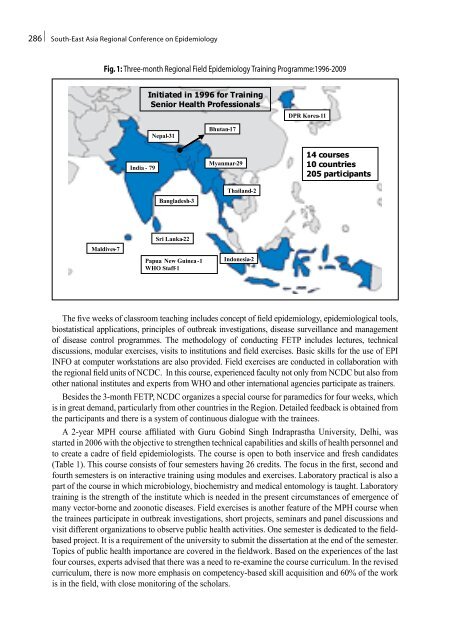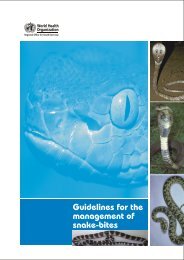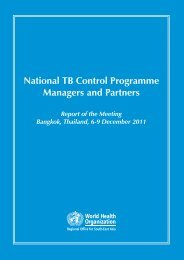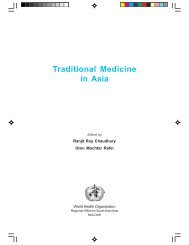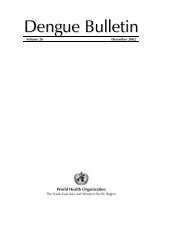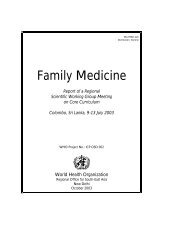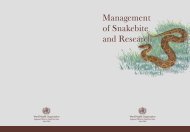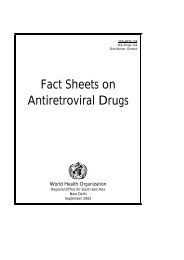South-East Asia Regional Conference on Epidemiology
South-East Asia Regional Conference on Epidemiology
South-East Asia Regional Conference on Epidemiology
Create successful ePaper yourself
Turn your PDF publications into a flip-book with our unique Google optimized e-Paper software.
286 | <str<strong>on</strong>g>South</str<strong>on</strong>g>-<str<strong>on</strong>g>East</str<strong>on</strong>g> <str<strong>on</strong>g>Asia</str<strong>on</strong>g> <str<strong>on</strong>g>Regi<strong>on</strong>al</str<strong>on</strong>g> <str<strong>on</strong>g>C<strong>on</strong>ference</str<strong>on</strong>g> <strong>on</strong> <strong>Epidemiology</strong><br />
Fig. 1: Three-m<strong>on</strong>th <str<strong>on</strong>g>Regi<strong>on</strong>al</str<strong>on</strong>g> Field <strong>Epidemiology</strong> Training Programme:1996-2009<br />
The five weeks of classroom teaching includes c<strong>on</strong>cept of field epidemiology, epidemiological tools,<br />
biostatistical applicati<strong>on</strong>s, principles of outbreak investigati<strong>on</strong>s, disease surveillance and management<br />
of disease c<strong>on</strong>trol programmes. The methodology of c<strong>on</strong>ducting FETP includes lectures, technical<br />
discussi<strong>on</strong>s, modular exercises, visits to instituti<strong>on</strong>s and field exercises. Basic skills for the use of EPI<br />
INFO at computer workstati<strong>on</strong>s are also provided. Field exercises are c<strong>on</strong>ducted in collaborati<strong>on</strong> with<br />
the regi<strong>on</strong>al field units of NCDC. In this course, experienced faculty not <strong>on</strong>ly from NCDC but also from<br />
other nati<strong>on</strong>al institutes and experts from WHO and other internati<strong>on</strong>al agencies participate as trainers.<br />
Besides the 3-m<strong>on</strong>th FETP, NCDC organizes a special course for paramedics for four weeks, which<br />
is in great demand, particularly from other countries in the Regi<strong>on</strong>. Detailed feedback is obtained from<br />
the participants and there is a system of c<strong>on</strong>tinuous dialogue with the trainees.<br />
A 2-year MPH course affiliated with Guru Gobind Singh Indraprastha University, Delhi, was<br />
started in 2006 with the objective to strengthen technical capabilities and skills of health pers<strong>on</strong>nel and<br />
to create a cadre of field epidemiologists. The course is open to both inservice and fresh candidates<br />
(Table 1). This course c<strong>on</strong>sists of four semesters having 26 credits. The focus in the first, sec<strong>on</strong>d and<br />
fourth semesters is <strong>on</strong> interactive training using modules and exercises. Laboratory practical is also a<br />
part of the course in which microbiology, biochemistry and medical entomology is taught. Laboratory<br />
training is the strength of the institute which is needed in the present circumstances of emergence of<br />
many vector-borne and zo<strong>on</strong>otic diseases. Field exercises is another feature of the MPH course when<br />
the trainees participate in outbreak investigati<strong>on</strong>s, short projects, seminars and panel discussi<strong>on</strong>s and<br />
visit different organizati<strong>on</strong>s to observe public health activities. One semester is dedicated to the fieldbased<br />
project. It is a requirement of the university to submit the dissertati<strong>on</strong> at the end of the semester.<br />
Topics of public health importance are covered in the fieldwork. Based <strong>on</strong> the experiences of the last<br />
four courses, experts advised that there was a need to re-examine the course curriculum. In the revised<br />
curriculum, there is now more emphasis <strong>on</strong> competency-based skill acquisiti<strong>on</strong> and 60% of the work<br />
is in the field, with close m<strong>on</strong>itoring of the scholars.


